仁爱英语九年级下册知识点归纳总结(课时版)
最新最新版仁爱英语九下全册知识点总结
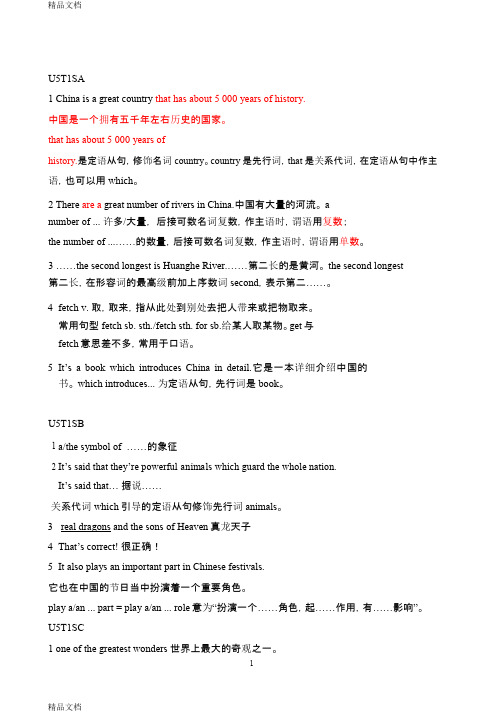
U5T1SA1 China is a great country that has about 5 000 years of history.中国是一个拥有五千年左右历史的国家。
that has about 5 000 years ofhistory.是定语从句,修饰名词country。
country是先行词,that是关系代词,在定语从句中作主语,也可以用which。
2 There are a great number of rivers in China.中国有大量的河流。
anumber of ... 许多/大量,后接可数名词复数,作主语时,谓语用复数;the number of ...……的数量,后接可数名词复数,作主语时,谓语用单数。
3 ……the second longest is Huanghe River.……第二长的是黄河。
the second longest第二长,在形容词的最高级前加上序数词second,表示第二……。
4fetch v. 取,取来,指从此处到别处去把人带来或把物取来。
常用句型fetch sb. sth./fetch sth. for sb.给某人取某物。
get与fetch意思差不多,常用于口语。
5It’s a book which introduces China in detail.它是一本详细介绍中国的书。
which introduces... 为定语从句,先行词是book。
U5T1SB1 a/the symbol of ……的象征2 It’s said that they’re powerful animals which guard the whole nation.It’s said that… 据说……关系代词which引导的定语从句修饰先行词animals。
3real dragons and the sons of Heaven真龙天子4That’s correct! 很正确!5It also plays an important part in Chinese festivals.它也在中国的节日当中扮演着一个重要角色。
仁爱英语九年级下册知识点归纳总结(话题版)
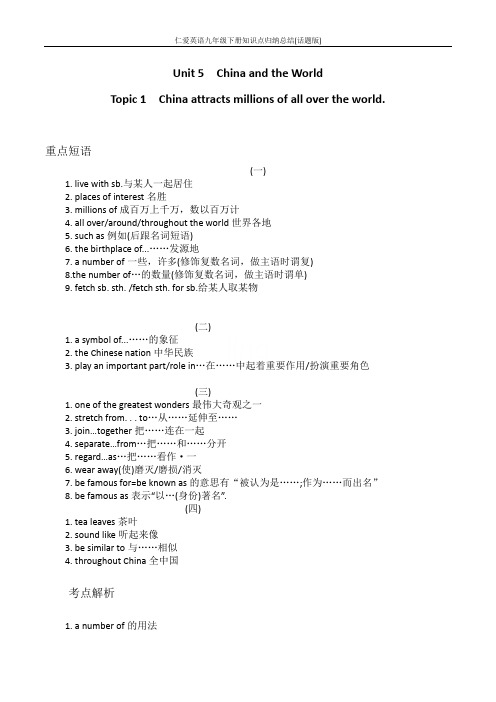
Unit 5 China and the WorldTopic 1 China attracts millions of all over the world.重点短语(一)1. live with sb.与某人一起居住2. places of interest名胜3. millions of成百万上千万,数以百万计4. all over/around/throughout the world世界各地5. such as例如(后跟名词短语)6. the birthplace of...……发源地7. a number of一些,许多(修饰复数名词,做主语时谓复)8.the number of…的数量(修饰复数名词,做主语时谓单)9. fetch sb. sth. /fetch sth. for sb.给某人取某物(二)1. a symbol of...……的象征2. the Chinese nation中华民族3. play an important part/role in…在……中起着重要作用/扮演重要角色(三)1. one of the greatest wonders最伟大奇观之一2. stretch from. . . to…从……延伸至……3. join…together把……连在一起4. separate…from…把……和……分开5. regard…as…把……看作·一6. wear away(使)磨灭/磨损/消灭7. be famous for=be known as的意思有“被认为是……;作为……而出名”8. be famous as表示“以…(身份)著名”.(四)1. tea leaves茶叶2. sound like听起来像3. be similar to与……相似4. throughout China全中国考点解析1. a number of的用法a number of意思是“许多……”,后接复数名词,谓语通常用复数:A number of students were absent from the meeting.许多学生没有到会。
九年级英语(仁爱版)下册语言点归纳.

九年级英语(仁爱版)下册语言点归纳编者:长乐华侨中学郑美珠Unit 6 Entertainment and FriendshipTopic 1 Do you like watching TV?一、重点词汇(一)词形转换1. education (形容词) educational2. alive (同义词) living3. Greece (语言) Greek4.hunter(动词) hunt5. negative (反义词) positive6. topic (同义词) subject(二)重点短语1.in one’s spare/ free time 在某人的业余时间2.agree with sb. 同意某人的意见3.win a prize 获得奖品4.be tired of…对……感到厌烦5.would rather…than…宁愿……而不愿6.fall in love (with sb.) 与某人相爱7.in total 总计8.once upon a time 从前9.be angry at sth. 对某事感到生气10.order sb. to do sth. 命令某人做某事11.from then on 从那时起12.keep secrets 保守秘密13.pay attention to…注意14.a homeless/ running /lucky dog 丧家犬/走狗/幸运儿15.stand for 代表16.have a huge /bad influence on…在…….方面起了巨大/ 坏的影响17.ways of doing sth. 做某事的方式18.keep…away from…使……远离…….19.a waste of time 浪费时间20.do a debate 辩论21.do research 做研究22.support one’s view 支持某人的观点二、重点句型1.It is hard for me to learn to play Chinese chess. 对于我来说学下中国象棋是很困难的.2.I’m tired of watching those shows. 我对看那些节目感到厌烦.3.Which program do you prefer, TV plays or sports shows?你更喜欢看哪一种节目,电视剧还是运动节目?4.----I would rather watch sports shows. 我更喜欢看运动节目.----So would I. 我也是.5. The mother of the land was quite angry at what he said.大地的母亲对他所说的相当的生气.6.Whenever scorpions appeared, hunters would hide.无论蝎子什么时候出现,猎人们都会躲藏起来.7.As we know, there are differences between western culture and Chinese culture.众所周知, 中西方文化存在着不同.三、重点知识点1.I would rather watch TV shows than sports shows. 我宁愿看电视剧而不愿看运动节目. would rather…than…表“宁愿……而不愿”, 与prefer…to…同义,但它们在结构上不同.前者是would rather do sth. than do sth.,后者是prefer doing sth. todoing sth.eg: I would rather stay at home than go out. = I prefer staying at home to going out.我宁愿呆在家中而不愿出去.2.Was his wife still alive? 他的妻子还活着吗?alive 表“活着的”, 常修饰人,而不修饰物. 一般作表语或宾补.living 同义, 既可修饰人, 也可修饰物. 在句中既可作定语也可作表语.eg: The old woman is still alive/living.(作表语) 那个老人还活着.The king wanted to keep Gulliver alive.(作宾补) 国王想让格利佛活着.There is no living things on Mars.(作定语)火星上没有生物.3.She ordered a scorpion to hide in the dark to attack him.order sb. to do sth. 命令/要求某人去做某事order sth for sb./ sth. 为某人/ 某物订购某物eg: The doctor ordered me to stay in bed. 医生命令我好好呆在床上休息.He often orders books for his son. 他经常为他的儿子订书.She ordered a suit for her dog. 她为她的狗订购了一套衣服.4.However, sometimes you do not forgive others.然而, 你有时不会原谅别人.forgive sb. sth. 原谅某人某事forgive sb. for doing sth. 请求别人原谅所做的事eg: She could forgive him anything. 她会原谅他的任何事.Please forgive me for disturbing you. 请原谅我打扰你了.5. But in western countries, dogs are considered honest and good friends of humans但是在西方国家, 狗被认为是诚实的, 是人类的好朋友.honest 用作形容词, 表“诚实的; 正直的” . 在句中可作定语, 表语或宾补.He is an honest man. = The man is honest.他是一个诚实的人.固定搭配: be honest with sb. 对某人坦诚相待to be honest 说实话, 老实说Topic 2 The Monkey King is my favorite character一、重点词汇(一)词形转换1. painter (动词) pain2. Dutch (国家) Holland3.argue (名词) argument4. luckily(形容词) lucky5. erase (名词) eraser(二)重点短语1.work hard at…在……方面努力工作2.works of art 艺术作品3.according to 根据4.the introduction to the painting 画的介绍5.express strong feelings 表达强烈的情感6.in the distance 在远处7.win every battle 赢得每一场的战役8.express the real meaning of friendship 说明了友谊的真正含义9.walk through the desert 穿过沙漠10.have an argument 争辩/吵11.slap sb. in the face 打了某人一计耳光12.keep on doing sth. 继续做某事13.take a bath 洗澡14.get stuck in 陷入……15.erase…from…从……当中抹/擦掉16.be good at hiding 善于隐身17.play alone 独自玩耍二、重点句型1.It is a pity that he died when he was very young. 遗憾的是, 他英年早逝.2.What (do you think) are the most important things I need to know about paintings?你认为,关于绘画, 我需要知道的最重要的事情是什么?3.Well, that depends on what kind of paintings you want to learn.4.Then you can decide whether you want to become a painter or not.(宾语从句)那时你就能决定是否想成为一名画家.5.It says here that Gu Kaizhi is quite good at painting figures.( 宾语从句)这儿写着顾恺之尤其擅长画人物画.6.The way he shows things in the distance is different from the way Gu Kaizhi does.(定语从句) 他描绘远景的方式与顾恺之不同.7.Perhaps that is the reason why I prefer to paint landscapes.(定语从句)也许那就是我为什么更喜欢画风景画的原因.8.…, it was Sandy and Pigsy who helped the Monkey King win every battle.(定语从句)沙僧和猪八戒帮助美猴王赢得每一次战役的胜利.9.One tree can’t make a forest. 独木不成林.10.But without saying anything, he wrote in the sand. 但什么也没说,他写在了沙子中.三、重点知识点1.paint 与draw 都具有“绘画”的含义,但有很大区别paint 表示用颜料等画带有色彩的画, 如油画、水彩画及画正式的肖像画。
仁爱英语九年级下册知识点、短语、句型、语法总结汇总精华版
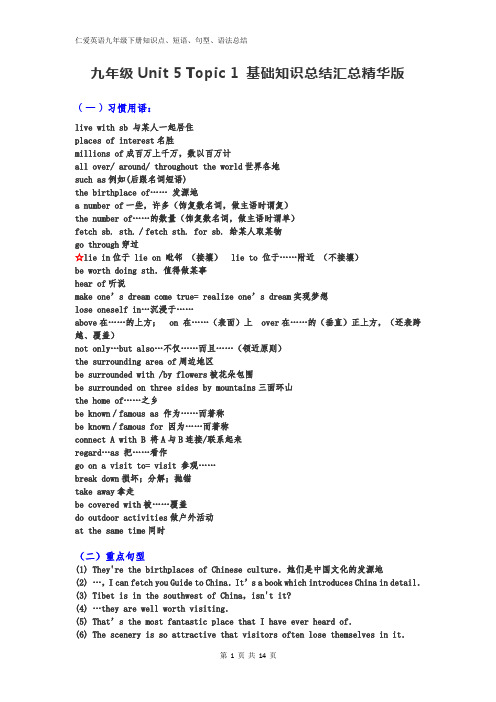
九年级Unit 5 Topic 1 基础知识总结汇总精华版(一)习惯用语:live with sb 与某人一起居住places of interest名胜millions of成百万上千万,数以百万计all over/ around/ throughout the world世界各地such as例如(后跟名词短语)the birthplace of……发源地a number of一些,许多(饰复数名词,做主语时谓复)the number of……的数量(饰复数名词,做主语时谓单)fetch sb. sth./fetch sth. for sb. 给某人取某物go through穿过☆lie in位于 lie on 毗邻(接壤)lie to 位于……附近(不接壤)be worth doing sth.值得做某事hear of听说make one’s dream come true= realize one’s dream实现梦想lose oneself in…沉浸于……above在……的上方;on 在……(表面)上over在……的(垂直)正上方,(还表跨越、覆盖)not only…but also…不仅……而且……(领近原则)the surrounding area of周边地区be surrounded with /by flowers被花朵包围be surrounded on three sides by mountains三面环山the home of……之乡be known/famous as 作为……而著称be known/famous for 因为……而著称connect A with B 将A与B连接/联系起来regard…as 把……看作go on a visit to= visit 参观……break down损坏;分解;抛锚take away拿走be covered with被……覆盖do outdoor activities做户外活动at the same time同时(二)重点句型(1) They're the birthplaces of Chinese culture.她们是中国文化的发源地(2) …,I can fetch you Guide to China.It’s a book which introduces China in detail.(3) Tibet is in the southwest of China,isn't it?(4) …they are well worth visiting.(5) That’s the most fantastic place that I have ever heard of.(6) The scenery is so attractive that visitors often lose themselves in it.(7) Hong Kong is known as the Oriental Pearl and Shopping Heaven.(8) People's way of life in the north is quite different from that in the south.(9) …,but people in the south travel not only by land but also by water.(10) It’s two years since Mr. and Mrs. Green came to China.= Mr. and Mrs. Green have been in China for two years,(三)定语从句(Ⅱ)1. who指人,that也可指人,在从句中作主语或宾语。
初三下册英语知识点仁爱版
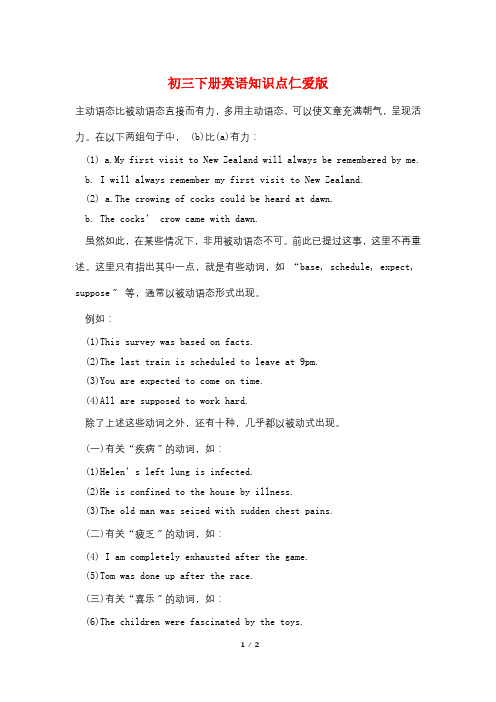
初三下册英语知识点仁爱版主动语态比被动语态直接而有力,多用主动语态,可以使文章充满朝气,呈现活力。
在以下两组句子中, (b)比(a)有力:(1) a.My first visit to New Zealand will always be remembered by me.b. I will always remember my first visit to New Zealand.(2) a.The crowing of cocks could be heard at dawn.b. The cocks’ crow came with dawn.虽然如此,在某些情况下,非用被动语态不可。
前此已提过这事,这里不再重述。
这里只有指出其中一点,就是有些动词,如“base, schedule, expect, suppose〞等,通常以被动语态形式出现。
例如:(1)This survey was based on facts.(2)The last train is scheduled to leave at 9pm.(3)You are expected to come on time.(4)All are supposed to work hard.除了上述这些动词之外,还有十种,几乎都以被动式出现。
(一)有关“疾病〞的动词,如:(1)Helen’s left lung is infected.(2)He is confined to the house by illness.(3)The old man was seized with sudden chest pains.(二)有关“疲乏〞的动词,如:(4) I am completely exhausted after the game.(5)Tom was done up after the race.(三)有关“喜乐〞的动词,如:(6)The children were fascinated by the toys.(7)We were delighted to hear the good news.(8) I am very pleased to see you here.(四)有关“延迟〞或“障碍〞的动词,如:(9)The workers were held up by the heavy rain.(10)The road was blocked by ice.(11)The train was delayed by 30 minutes.(五)有关“惯性动作〞的动词,如:(12)Tom is addicted to smoking.(13)Foreign workers are quite used to hard work.(六)有关“烦恼〞或“焦急〞的动词,如:(14)Who was upset by John?(15)Mother was annoyed to know this.(七)有关“惊奇〞或“震惊〞的动词,如:(16) I was surprised to see him here.(17)All were shocked to hear the bad news.(八)有关“包围〞的动词,如:(18)The troops were surrounded.(19)Troy was besieged.(九)有关“沾污〞或“污化〞的动词,如:(20)Judy’s reputation is tarnished.(21)The water was contaminated with oil.(十)有关“害怕〞或“混乱〞的动词,如:(22)All were frightened out of their wits.(23)He was puzzled about what to do next.要注意的一点是,上面这十类动词有些已渐渐失去了动词力量,转化为惯用语。
仁爱英语九下知识点归纳
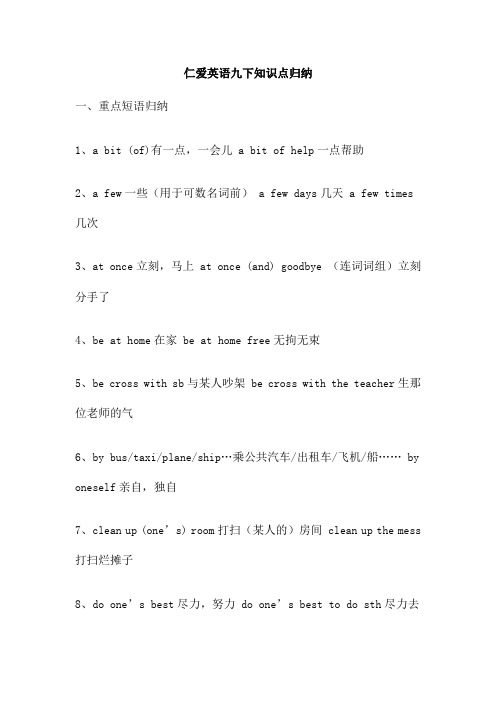
仁爱英语九下知识点归纳一、重点短语归纳1、a bit (of)有一点,一会儿 a bit of help一点帮助2、a few一些(用于可数名词前) a few days几天 a few times 几次3、at once立刻,马上 at once (and) goodbye (连词词组)立刻分手了4、be at home在家 be at home free无拘无束5、be cross with sb与某人吵架 be cross with the teacher生那位老师的气6、by bus/taxi/plane/ship…乘公共汽车/出租车/飞机/船…… by oneself亲自,独自7、clean up (one’s) room打扫(某人的)房间 clean up the mess 打扫烂摊子8、do one’s best尽力,努力 do one’s best to do sth尽力去做某事9、get on (with sb) (与某人)相处 get on well with sb与某人相处得好 get on well with one’s work工作进展顺利10、get to the station到车站 get to the airport到机场 get to the head of the queue到队头 get to know sb认识某人11、give sb a hand帮助某人 give sb a hand with sth帮助某人做某事 give sb a hand in doing sth帮助某人做某事 give sb a call 给某人打 give one’s regards to sb向某人问候 give sb a ring 给某人打 give sb a message给某人留言 give the message to sb 给某人留言12、have a good time (doing sth)玩得高兴,过得愉快 have a good time (in) doing sth做某事玩得高兴、过得愉快 have a good time with sb和某人一起玩得高兴 have a good time at home在家过得愉快 have a good time at work在工作上过得愉快 have a good time on one’s own自己过得愉快13、help oneself to请自便 help oneself to sth请自便吃某菜 help (to) do sth帮助做某事 help sb (to) do sth帮助某人做某事 helpsb with sth帮助某人做某事 help oneself to do sth请自便做某事 help oneself with sth请自便用某物 help with one’s work 帮助工作 help with one’s homework帮助做家庭作业 help to clean up the classroom帮忙打扫教室 help to clean up the sitting-room 帮忙打扫客厅14、keep healthy/fit保持健康 keep healthy/fit by doing sth 通过做某事保持健康 keep healthy/fit on one’s own自己保持健康 keep fit in every way通过各种方法保持健康 keep fit and strong保持健康强壮 keep healthy/fit through exercise通过锻炼保持健康 keep healthy/fit through good eating habits通过良好的饮食习惯保持健康 keep healthy/fit by going to see a doctor通过看医生保持健康15、like this这样(指前面所述内容) like this, like that这样那样(分别) like this and that这样那样(交替) like this kind of thing这样一类东西 like this sort of thing这样一类的东西 like this, that and the other这样那样都来点 like this and that in turn这样那样交替进行16、make one’s way to…前往…… make one’s way through…穿过……,在……中前进 make one’s way home回家 make one’s way to the nearest crossing走到最近的十字路口 make one’s way to the station到车站去 make one’s way to the classroom到教室去 make one’s way through the crowd在人群中前进 make one’s way through the traffic在车流中前进17、not at all别客气,没什么 not at all (用于回答感谢,用在正式场合)不用谢,没什么 not at all (用于回答道歉,意为一点也不介意)没关系,一点也不 not at all (用于表示否定意义或委婉谢绝)决不,一点也不 not at all (用于表示轻蔑、不耐烦等)得了,得了,别胡扯了! not at all (用于表示不在乎、一无所知等)没关系,一点也不 not at all (用于强调程度)非常 not at all (用于加强语气)完全地,彻底地 not at all you are welcome不客气(回答感谢用语) you are welcome不客气(回答道歉用语) welcome 是 you are welcome的缩写形式。
仁爱英语九年级下册知识点归纳总结(话题版)

Unit 5 China and the WorldTopic 1 China attracts millions of all over the world.重点短语(一)1. live with sb.与某人一起居住2. places of interest名胜3. millions of成百万上千万,数以百万计4. all over/around/throughout the world世界各地5. such as例如(后跟名词短语)6. the birthplace of...……发源地7. a number of一些,许多(修饰复数名词,做主语时谓复)8.the number of…的数量(修饰复数名词,做主语时谓单)9. fetch sb. sth. /fetch sth. for sb.给某人取某物(二)1. a symbol of...……的象征2. the Chinese nation中华民族3. play an important part/role in…在……中起着重要作用/扮演重要角色(三)1. one of the greatest wonders最伟大奇观之一2. stretch from. . . to…从……延伸至……3. join…together把……连在一起4. separate…from…把……和……分开5. regard…as…把……看作·一6. wear away(使)磨灭/磨损/消灭7. be famous for=be known as的意思有“被认为是……;作为……而出名”8. be famous as表示“以…(身份)著名”.(四)1. tea leaves茶叶2. sound like听起来像3. be similar to与……相似4. throughout China全中国考点解析1. a number of的用法a number of意思是“许多……”,后接复数名词,谓语通常用复数:A number of students were absent from the meeting.许多学生没有到会。
仁爱九年级全册知识总结
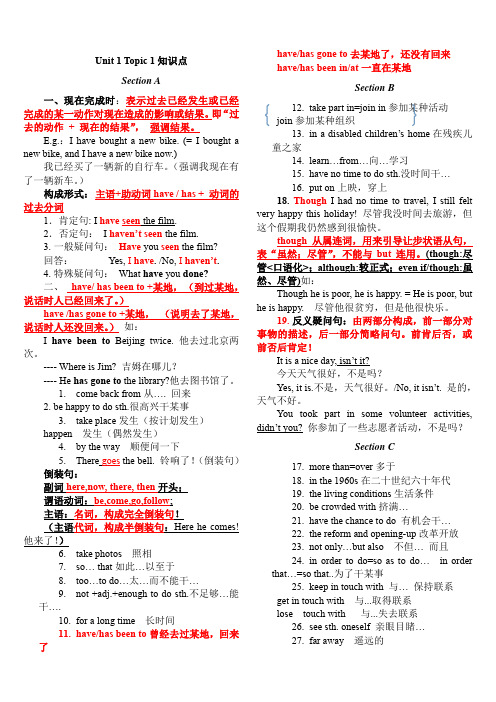
Unit 1 Topic 1知识点Section A一、现在完成时:表示过去已经发生或已经完成的某一动作对现在造成的影响或结果。
即“过去的动作+ 现在的结果”,强调结果。
E.g.:I have bought a new bike. (= I bought a new bike, and I have a new bike now.)我已经买了一辆新的自行车。
(强调我现在有了一辆新车。
)构成形式:主语+助动词have / has + 动词的过去分词1.肯定句: I have seen the film.2.否定句:I haven’t seen the film.3.一般疑问句:Have you seen the film?回答:Yes, I have. /No, I haven’t.4.特殊疑问句:What have you done?二、have/ has been to +某地,(到过某地,说话时人已经回来了。
)have /has gone to +某地,(说明去了某地,说话时人还没回来。
)如:I have been to Beijing twice. 他去过北京两次。
---- Where is Jim? 吉姆在哪儿?---- He has gone to the library?他去图书馆了。
e back from从…. 回来2. be happy to do sth.很高兴干某事3.take place发生(按计划发生)happen 发生(偶然发生)4.by the way 顺便问一下5.There goes the bell. 铃响了!(倒装句)倒装句:副词here,now, there, then开头;谓语动词:be,come,go,follow;主语:名词,构成完全倒装句!(主语代词,构成半倒装句:Here he comes! 他来了!)6.take photos 照相7.so… that如此…以至于8.too…to do…太…而不能干…9.not +adj.+enough to do sth.不足够…能干….10.for a long time 长时间11.have/has been to曾经去过某地,回来了have/has gone to去某地了,还没有回来have/has been in/at一直在某地Section B12.take part in=join in参加某种活动join参加某种组织13.in a disabled children’s home在残疾儿童之家14.learn…from…向…学习15.have no time to do sth.没时间干…16.put on上映,穿上18. Though I had no time to travel, I still felt very happy this holiday! 尽管我没时间去旅游,但这个假期我仍然感到很愉快。
- 1、下载文档前请自行甄别文档内容的完整性,平台不提供额外的编辑、内容补充、找答案等附加服务。
- 2、"仅部分预览"的文档,不可在线预览部分如存在完整性等问题,可反馈申请退款(可完整预览的文档不适用该条件!)。
- 3、如文档侵犯您的权益,请联系客服反馈,我们会尽快为您处理(人工客服工作时间:9:00-18:30)。
Unit 5 China and the WorldTopic 1 China attracts millions of all over the world.Section A★重难点解析1. China is a great country that has about 5 000 years of history.中国是一个拥有大约五千多年历史的伟大国家。
这是一个由that引导的定语从句,修饰先行词country。
关系代词that在从句中作主语,不能省略,此处也可用which。
如:This is a book that/which tells spoken English。
这是一本讲英语口语的书。
There are some TV programs that/which are good for children.电视上有一些对孩子们有益的节目。
2. There are a great number of rivers in China. 中国有许多河流。
a number of意为“一些”,是固定短语,用作定语。
后接名词或代词的复数形式,作主语时谓语动词用复数。
如:A number of my friends think I should take a holiday.我的一些朋友认为我应该休假。
a great number of = a large number of/large numbers of大量,许多。
如:A large number of/Large numbers of vehicles had to be stopped because of the heavy snow.大量的机动车辆因大雪不得不停驶。
【链接】the number of…意为“……的数量(数目)”,后接复数名词,但谓语动词用单数。
如:The number of students in this school is about 2 500.这所学校的学生大约有2500人。
This killing brings the number of deaths this year to 28.这次谋杀使今年的死亡人数达到28人。
3. I can fetch you Guide to China. It's a book which introduces China in detail.我可以拿《中国指南》给你。
这本书详细介绍了中国。
(1)introduce:.介绍,引见introduce sb. /sth.介绍某人/某物;introduce sb. /sth to sb.向某人介绍某人/某物;introduce oneself to sb.向某人自我介绍。
如:He introduced me to“Greek girl at the party.他在聚会上介绍我认识一位希腊姑娘。
[拓展]introduction n.指示;说明。
如:Can I introduce myself? I'm Helen Brown.让我来自我介绍一下吧。
我叫海伦·布朗。
The introduction of steel made tall buildings easier to build.钢的引进使用使高大的建筑物更易于建造。
Read the introductions on the bottle before you take the medicine.先看瓶子上的说明再吃药。
( 2 ) in detail详细地。
如:He described the accident in great detail. 他极详细地描述了那次事故。
4. It's a mountain with lots of strange pine trees.它是一座长着很多奇松的山。
(1) with和它后面的部分构成介词结构,作后置定语,修饰前面的名词。
如:Do you know that girl with long hair? 你认识那个长发女孩吗?I want to rent a house with a garden. 我想租一个带花园的房子。
(2 ) strange形容词,意为“奇怪的;陌生的”。
如:A strange thing happened this morning.今天上午发生了一件怪事He stood in a strange street.他站在一条陌生的街道上[链接]stranger n.陌生人。
如:They often tell their daughter not to speak to strangers.他们经常告诉女儿不要和陌生人讲话5. It lies in Anhui Province.它位于安徽省境内。
lie in表示“位于……内”,两者是包含关系。
如:Beijing lies in the north of China.北京位于中国的北部。
Mount Tai lies in Tai'an, Shandong Province·泰山位于山东省泰安市境内。
Section B★重难点解析1. What are those animals that are carved on the stones?那些雕刻在石头上的动物是什么?(1) that are carved on the stones是定语从句。
that作定语从句的主语,不能省略。
( 2 ) stone n.石头,石料。
如:The building is built of stone.这座建筑是用石料建的。
(不可数名词,意为“石料”。
)I picked up a stone and threw it at the dog.我拾起一块石头向狗扔去。
(可数名词,意为“石头”。
)2. It's said that they're powerful animals which guard the whole nation.据说它们是保卫国家的威猛动物。
guard在此为动词,意为“保卫,守卫”。
如:It's our duty to guard this bridge.守卫这座桥是我们的职责。
The soldiers are guarding our nation while we are celebrating the Spring Festival.我们欢度春节时,战士们正保卫着我们的国家。
[拓展」guard还可作名词,意为“警卫;警戒”。
如:Lenin said to the guard that he had done right.列宁对那个卫兵说他做得对。
There are soldiers on guard at the gate.有士兵守在大门口。
3. It also plays an important part in Chinese festivals. 它在中国的节日里扮演者重要角色。
Play a part 意为“扮演角色”,相当于play a role。
它还有“起作用,有影响”的意思。
The question of cost will play an important part in our decision. 成本问题会对我们的决定起重要的作用。
Section C★重难点解析1. Few of these walls remain.只有极少的墙遗留下来。
remain v.剩余,遗留;仍然是。
如:A few leaves still remained on the tree.树上还剩下一些叶子。
I asked her a question but she remained silent.我问了她一个问题,但她仍然保持沉默。
2. The Great Wall was first built by ancient people to separate themfrom their enemies.古代的人们修建长城首先是为了把他们和敌人隔开。
Separate v.,意为“(使)分开,分离;区分”,常和from连用,表示“与……分开”。
如:The war separated many families.这场战争使很多家庭妻离子散。
My wife separated the bad apples from the good ones.我妻子把坏苹果与好苹果分开来。
3. Those Ming dynasty rulers did not expect that it would later be used to bring tourists into China.那些明朝的统治者没有预料到它(长城)以后会用来吸引游客到中国。
(1) expect v.意为“预料;期待”,后可接动词不定式、带不定式的复合宾语或宾语从句。
如:You can't expect to learn a foreign language in a few months.你不要指望在几个月内就能学到一门外语。
I expect her to pass the exam.我料想她会通过考试。
I expect that you would finish the work on time.我料到你会按时完成这项工作的(2 ) bring. .. into带进……,拿进……,领进……。
如:Will you bring that book into my office?你把那本书拿到我的办公室来,好吗?4. Suppose you are a tourist guide and your group members are tourists from America who are very interested in the history of the Great Wall.假设你是位导游,你的旅行团成员是对长城的历史很感兴趣的美国游客。
(1)suppose:.假定,假设;推断。
如:Let's suppose his answer is right我们假定他的答案是正确的。
I supposed her to be in the library.我猜想她在图书馆里。
( 2) who were very interested in the history of the Great Wall是who引导的定语从句,修饰先行词tourists。
关系代词who作主语时,不能省略。
如:Do you know that boy who won the first prize?你认识那个获得一等奖的男生吗,Section D★重难点解析1. The home of tea, which has more than 4 000 years of history, isChina.中国作为茶的故乡,已有4 000多年的历史。
